Case Study: Construction Safety and Accident Prevention
VerifiedAdded on 2023/06/10
|14
|3599
|268
Case Study
AI Summary
This case study delves into a construction accident involving a worker who succumbed to head injuries in Coober Pedy, Australia, highlighting the critical importance of safety protocols in the construction industry. The case study analyzes the accident, emphasizing the need for risk assessment and management to prevent future incidents. It examines the victim's failure to assess site risks and adhere to safety measures, and explores accident prevention strategies, including the use of personal protective equipment (PPE), hazard identification, and the implementation of safety training programs. The report also discusses the role of supervisors and effective communication in ensuring a safe working environment. The study underscores the construction industry's high-risk nature and the importance of proactive safety measures to safeguard workers and improve productivity.
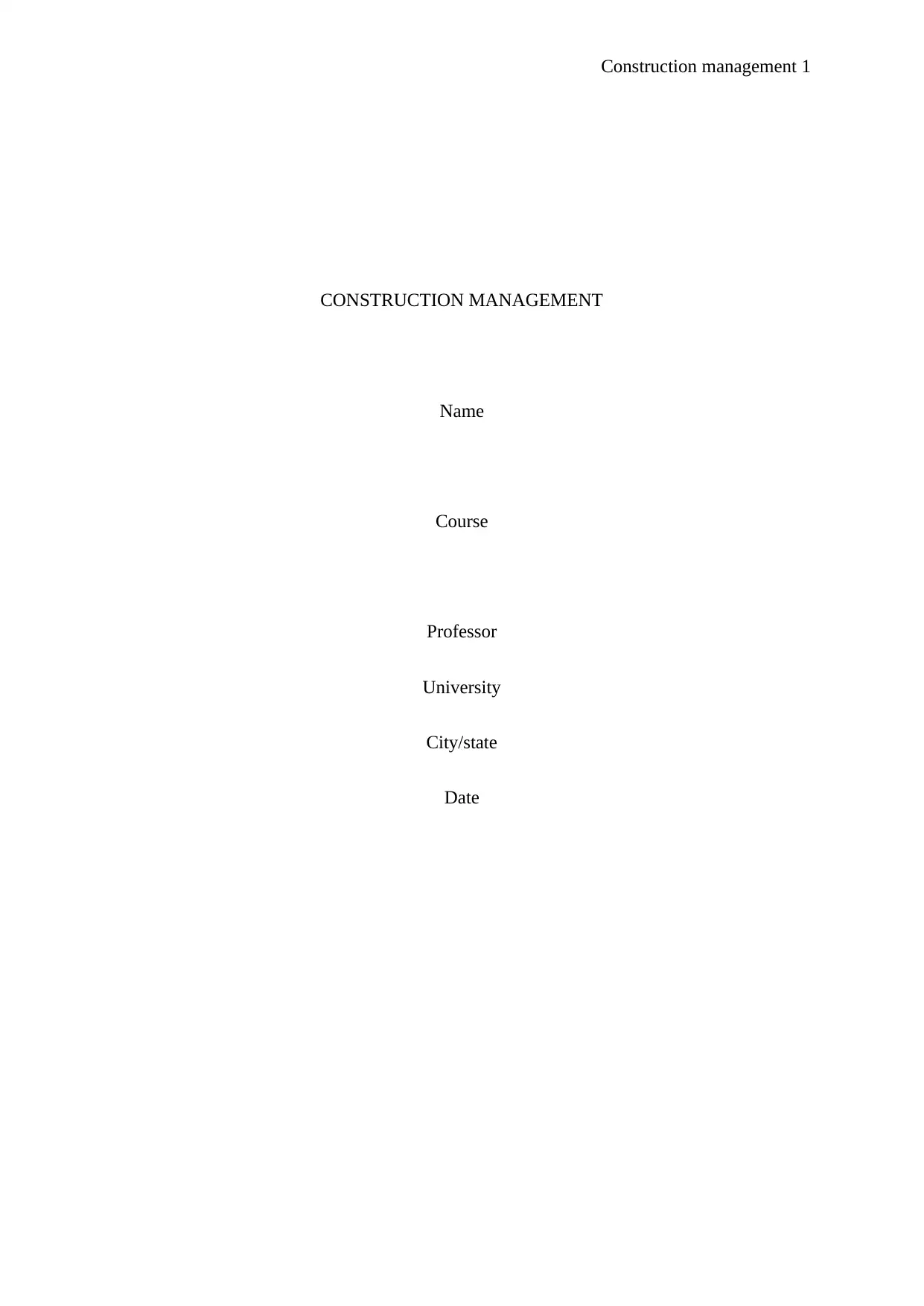
Construction management 1
CONSTRUCTION MANAGEMENT
Name
Course
Professor
University
City/state
Date
CONSTRUCTION MANAGEMENT
Name
Course
Professor
University
City/state
Date
Paraphrase This Document
Need a fresh take? Get an instant paraphrase of this document with our AI Paraphraser
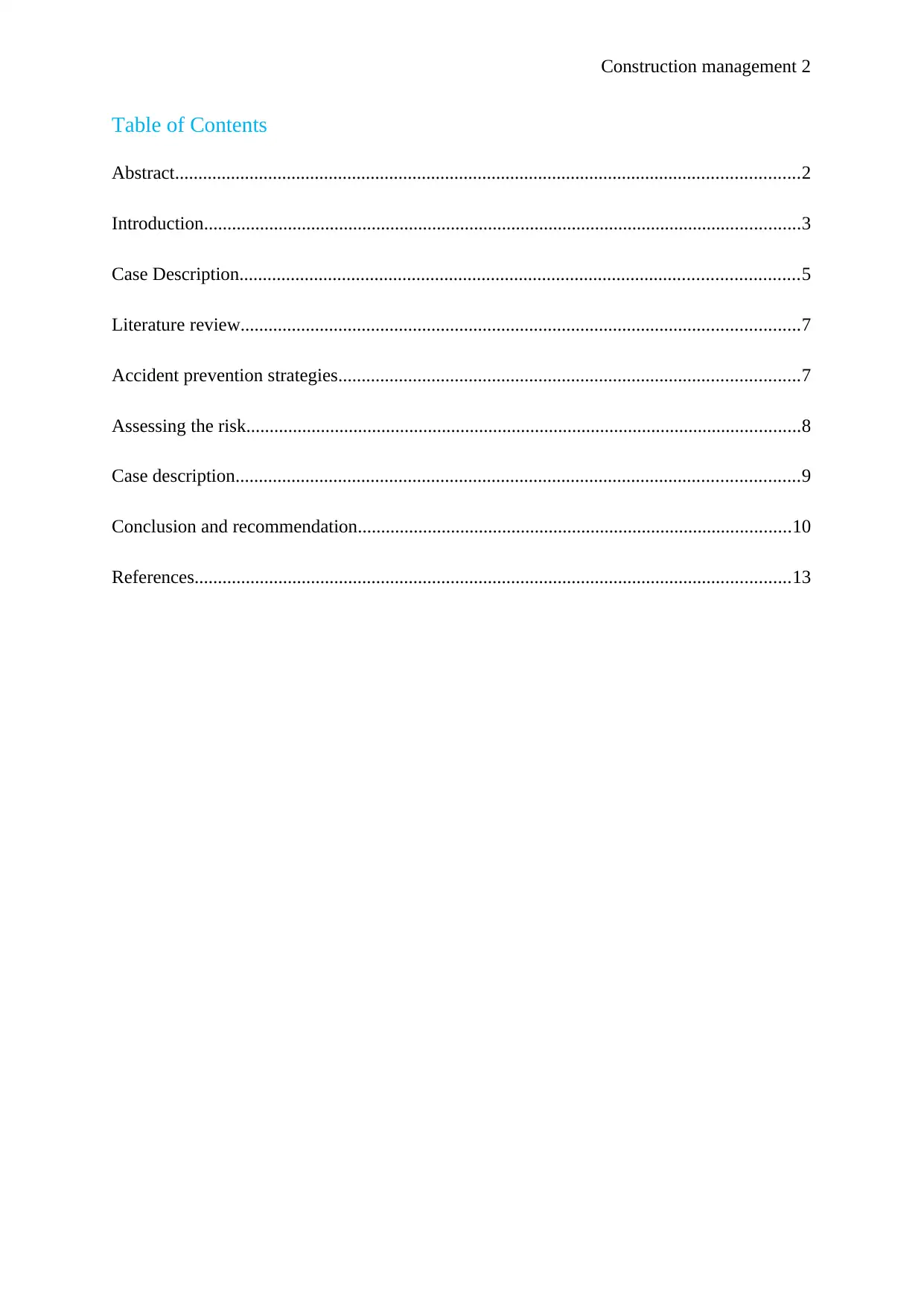
Construction management 2
Table of Contents
Abstract......................................................................................................................................2
Introduction................................................................................................................................3
Case Description........................................................................................................................5
Literature review........................................................................................................................7
Accident prevention strategies...................................................................................................7
Assessing the risk.......................................................................................................................8
Case description.........................................................................................................................9
Conclusion and recommendation.............................................................................................10
References................................................................................................................................13
Table of Contents
Abstract......................................................................................................................................2
Introduction................................................................................................................................3
Case Description........................................................................................................................5
Literature review........................................................................................................................7
Accident prevention strategies...................................................................................................7
Assessing the risk.......................................................................................................................8
Case description.........................................................................................................................9
Conclusion and recommendation.............................................................................................10
References................................................................................................................................13
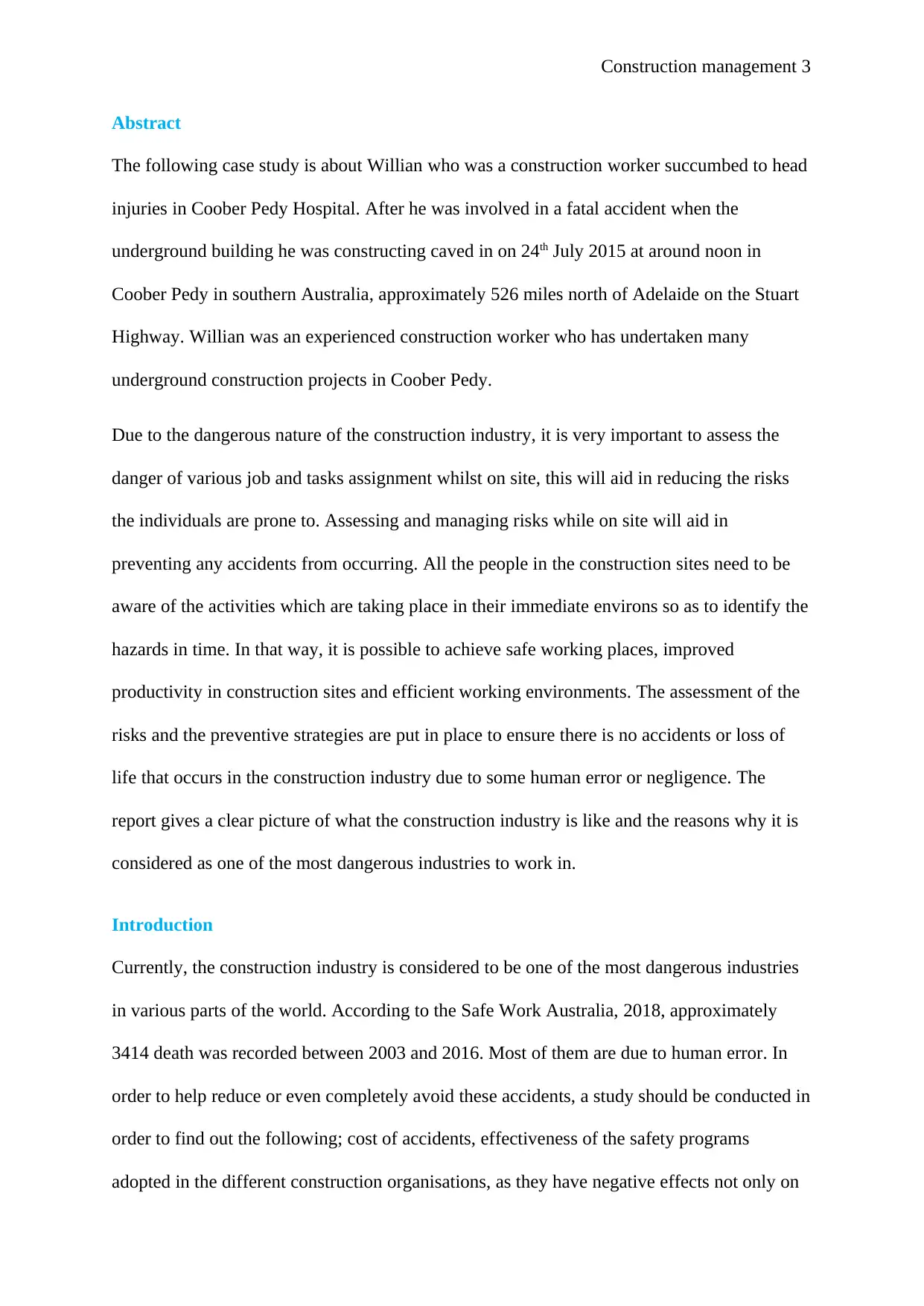
Construction management 3
Abstract
The following case study is about Willian who was a construction worker succumbed to head
injuries in Coober Pedy Hospital. After he was involved in a fatal accident when the
underground building he was constructing caved in on 24th July 2015 at around noon in
Coober Pedy in southern Australia, approximately 526 miles north of Adelaide on the Stuart
Highway. Willian was an experienced construction worker who has undertaken many
underground construction projects in Coober Pedy.
Due to the dangerous nature of the construction industry, it is very important to assess the
danger of various job and tasks assignment whilst on site, this will aid in reducing the risks
the individuals are prone to. Assessing and managing risks while on site will aid in
preventing any accidents from occurring. All the people in the construction sites need to be
aware of the activities which are taking place in their immediate environs so as to identify the
hazards in time. In that way, it is possible to achieve safe working places, improved
productivity in construction sites and efficient working environments. The assessment of the
risks and the preventive strategies are put in place to ensure there is no accidents or loss of
life that occurs in the construction industry due to some human error or negligence. The
report gives a clear picture of what the construction industry is like and the reasons why it is
considered as one of the most dangerous industries to work in.
Introduction
Currently, the construction industry is considered to be one of the most dangerous industries
in various parts of the world. According to the Safe Work Australia, 2018, approximately
3414 death was recorded between 2003 and 2016. Most of them are due to human error. In
order to help reduce or even completely avoid these accidents, a study should be conducted in
order to find out the following; cost of accidents, effectiveness of the safety programs
adopted in the different construction organisations, as they have negative effects not only on
Abstract
The following case study is about Willian who was a construction worker succumbed to head
injuries in Coober Pedy Hospital. After he was involved in a fatal accident when the
underground building he was constructing caved in on 24th July 2015 at around noon in
Coober Pedy in southern Australia, approximately 526 miles north of Adelaide on the Stuart
Highway. Willian was an experienced construction worker who has undertaken many
underground construction projects in Coober Pedy.
Due to the dangerous nature of the construction industry, it is very important to assess the
danger of various job and tasks assignment whilst on site, this will aid in reducing the risks
the individuals are prone to. Assessing and managing risks while on site will aid in
preventing any accidents from occurring. All the people in the construction sites need to be
aware of the activities which are taking place in their immediate environs so as to identify the
hazards in time. In that way, it is possible to achieve safe working places, improved
productivity in construction sites and efficient working environments. The assessment of the
risks and the preventive strategies are put in place to ensure there is no accidents or loss of
life that occurs in the construction industry due to some human error or negligence. The
report gives a clear picture of what the construction industry is like and the reasons why it is
considered as one of the most dangerous industries to work in.
Introduction
Currently, the construction industry is considered to be one of the most dangerous industries
in various parts of the world. According to the Safe Work Australia, 2018, approximately
3414 death was recorded between 2003 and 2016. Most of them are due to human error. In
order to help reduce or even completely avoid these accidents, a study should be conducted in
order to find out the following; cost of accidents, effectiveness of the safety programs
adopted in the different construction organisations, as they have negative effects not only on
⊘ This is a preview!⊘
Do you want full access?
Subscribe today to unlock all pages.

Trusted by 1+ million students worldwide
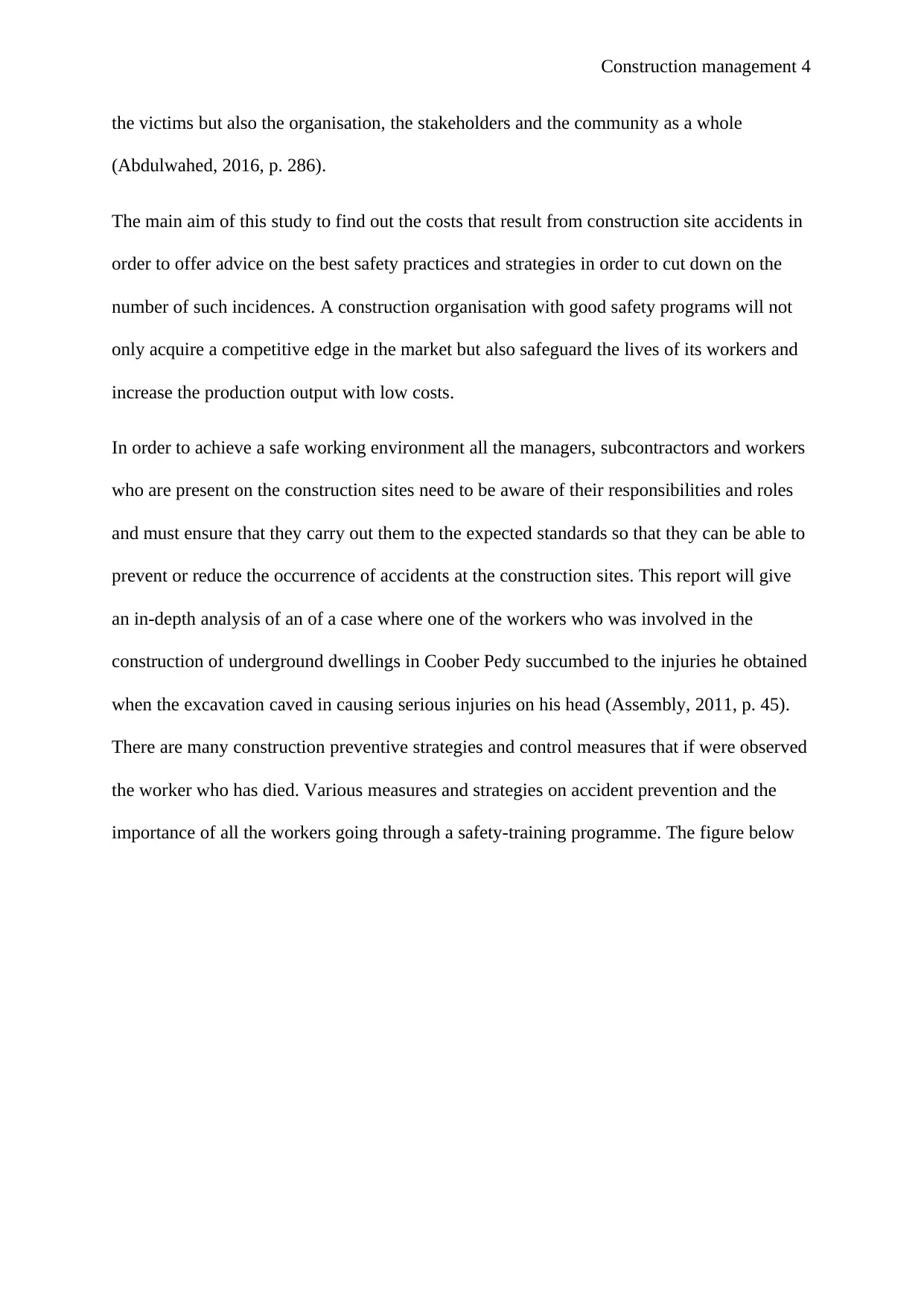
Construction management 4
the victims but also the organisation, the stakeholders and the community as a whole
(Abdulwahed, 2016, p. 286).
The main aim of this study to find out the costs that result from construction site accidents in
order to offer advice on the best safety practices and strategies in order to cut down on the
number of such incidences. A construction organisation with good safety programs will not
only acquire a competitive edge in the market but also safeguard the lives of its workers and
increase the production output with low costs.
In order to achieve a safe working environment all the managers, subcontractors and workers
who are present on the construction sites need to be aware of their responsibilities and roles
and must ensure that they carry out them to the expected standards so that they can be able to
prevent or reduce the occurrence of accidents at the construction sites. This report will give
an in-depth analysis of an of a case where one of the workers who was involved in the
construction of underground dwellings in Coober Pedy succumbed to the injuries he obtained
when the excavation caved in causing serious injuries on his head (Assembly, 2011, p. 45).
There are many construction preventive strategies and control measures that if were observed
the worker who has died. Various measures and strategies on accident prevention and the
importance of all the workers going through a safety-training programme. The figure below
the victims but also the organisation, the stakeholders and the community as a whole
(Abdulwahed, 2016, p. 286).
The main aim of this study to find out the costs that result from construction site accidents in
order to offer advice on the best safety practices and strategies in order to cut down on the
number of such incidences. A construction organisation with good safety programs will not
only acquire a competitive edge in the market but also safeguard the lives of its workers and
increase the production output with low costs.
In order to achieve a safe working environment all the managers, subcontractors and workers
who are present on the construction sites need to be aware of their responsibilities and roles
and must ensure that they carry out them to the expected standards so that they can be able to
prevent or reduce the occurrence of accidents at the construction sites. This report will give
an in-depth analysis of an of a case where one of the workers who was involved in the
construction of underground dwellings in Coober Pedy succumbed to the injuries he obtained
when the excavation caved in causing serious injuries on his head (Assembly, 2011, p. 45).
There are many construction preventive strategies and control measures that if were observed
the worker who has died. Various measures and strategies on accident prevention and the
importance of all the workers going through a safety-training programme. The figure below
Paraphrase This Document
Need a fresh take? Get an instant paraphrase of this document with our AI Paraphraser
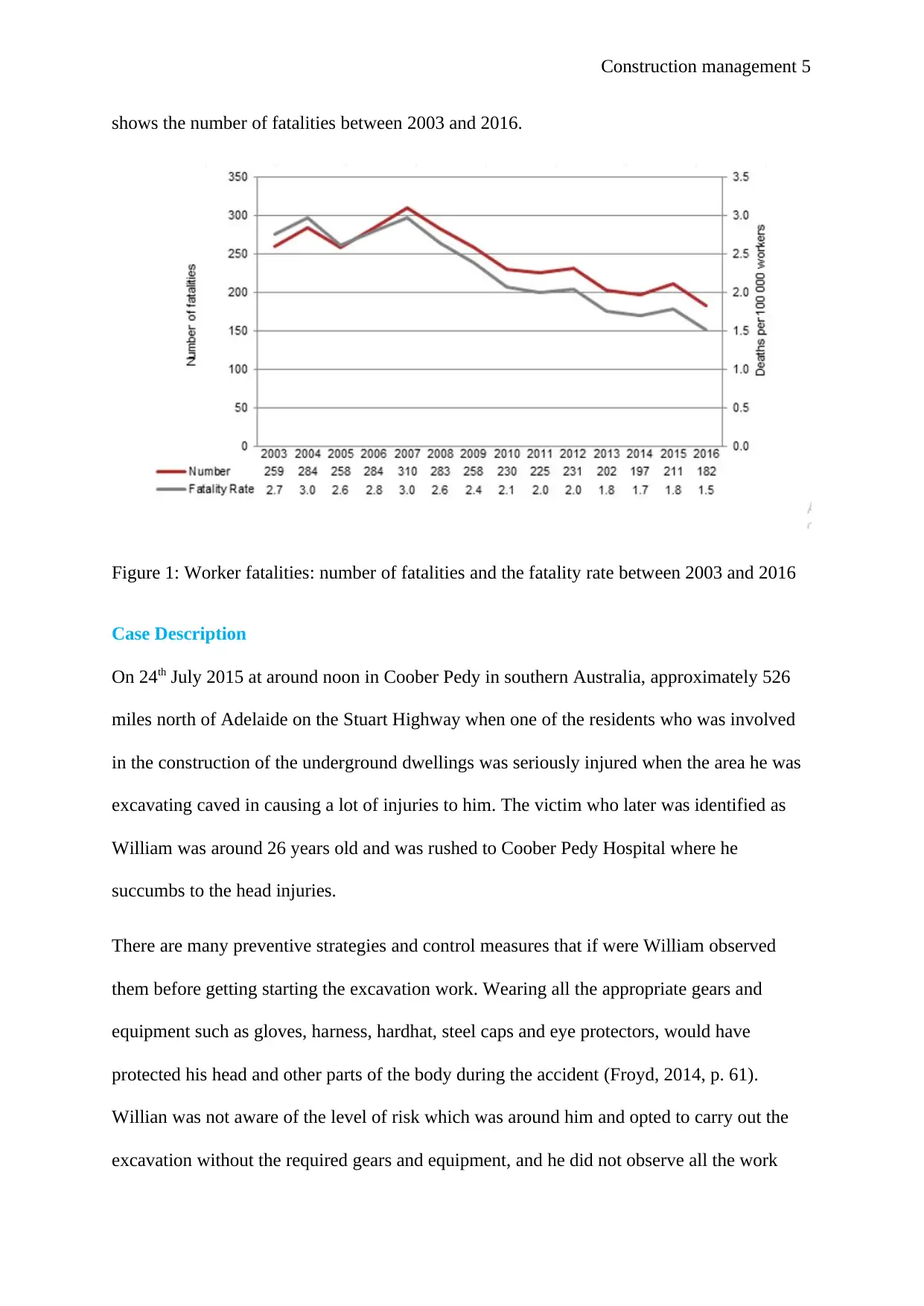
Construction management 5
shows the number of fatalities between 2003 and 2016.
Figure 1: Worker fatalities: number of fatalities and the fatality rate between 2003 and 2016
Case Description
On 24th July 2015 at around noon in Coober Pedy in southern Australia, approximately 526
miles north of Adelaide on the Stuart Highway when one of the residents who was involved
in the construction of the underground dwellings was seriously injured when the area he was
excavating caved in causing a lot of injuries to him. The victim who later was identified as
William was around 26 years old and was rushed to Coober Pedy Hospital where he
succumbs to the head injuries.
There are many preventive strategies and control measures that if were William observed
them before getting starting the excavation work. Wearing all the appropriate gears and
equipment such as gloves, harness, hardhat, steel caps and eye protectors, would have
protected his head and other parts of the body during the accident (Froyd, 2014, p. 61).
Willian was not aware of the level of risk which was around him and opted to carry out the
excavation without the required gears and equipment, and he did not observe all the work
shows the number of fatalities between 2003 and 2016.
Figure 1: Worker fatalities: number of fatalities and the fatality rate between 2003 and 2016
Case Description
On 24th July 2015 at around noon in Coober Pedy in southern Australia, approximately 526
miles north of Adelaide on the Stuart Highway when one of the residents who was involved
in the construction of the underground dwellings was seriously injured when the area he was
excavating caved in causing a lot of injuries to him. The victim who later was identified as
William was around 26 years old and was rushed to Coober Pedy Hospital where he
succumbs to the head injuries.
There are many preventive strategies and control measures that if were William observed
them before getting starting the excavation work. Wearing all the appropriate gears and
equipment such as gloves, harness, hardhat, steel caps and eye protectors, would have
protected his head and other parts of the body during the accident (Froyd, 2014, p. 61).
Willian was not aware of the level of risk which was around him and opted to carry out the
excavation without the required gears and equipment, and he did not observe all the work
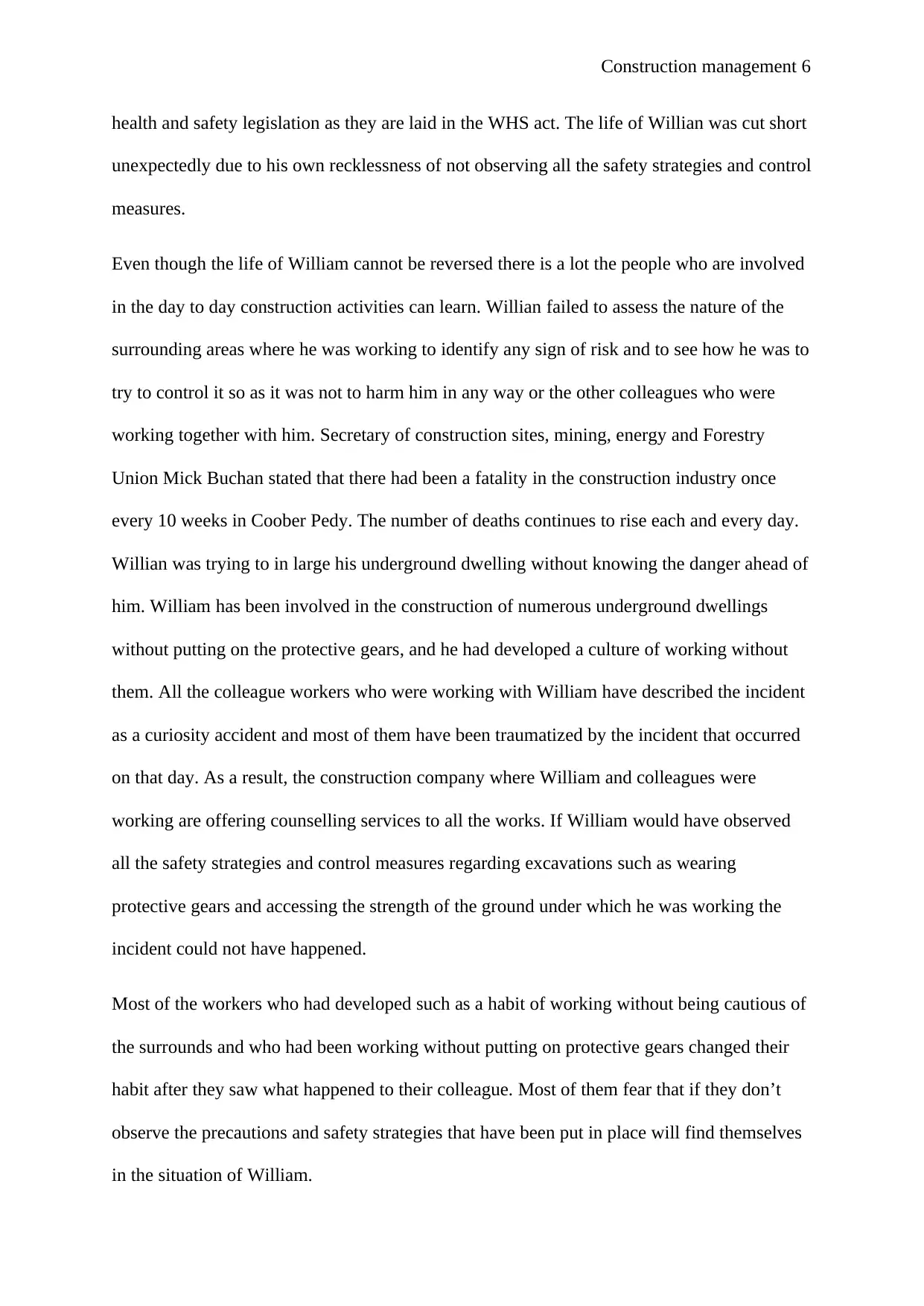
Construction management 6
health and safety legislation as they are laid in the WHS act. The life of Willian was cut short
unexpectedly due to his own recklessness of not observing all the safety strategies and control
measures.
Even though the life of William cannot be reversed there is a lot the people who are involved
in the day to day construction activities can learn. Willian failed to assess the nature of the
surrounding areas where he was working to identify any sign of risk and to see how he was to
try to control it so as it was not to harm him in any way or the other colleagues who were
working together with him. Secretary of construction sites, mining, energy and Forestry
Union Mick Buchan stated that there had been a fatality in the construction industry once
every 10 weeks in Coober Pedy. The number of deaths continues to rise each and every day.
Willian was trying to in large his underground dwelling without knowing the danger ahead of
him. William has been involved in the construction of numerous underground dwellings
without putting on the protective gears, and he had developed a culture of working without
them. All the colleague workers who were working with William have described the incident
as a curiosity accident and most of them have been traumatized by the incident that occurred
on that day. As a result, the construction company where William and colleagues were
working are offering counselling services to all the works. If William would have observed
all the safety strategies and control measures regarding excavations such as wearing
protective gears and accessing the strength of the ground under which he was working the
incident could not have happened.
Most of the workers who had developed such as a habit of working without being cautious of
the surrounds and who had been working without putting on protective gears changed their
habit after they saw what happened to their colleague. Most of them fear that if they don’t
observe the precautions and safety strategies that have been put in place will find themselves
in the situation of William.
health and safety legislation as they are laid in the WHS act. The life of Willian was cut short
unexpectedly due to his own recklessness of not observing all the safety strategies and control
measures.
Even though the life of William cannot be reversed there is a lot the people who are involved
in the day to day construction activities can learn. Willian failed to assess the nature of the
surrounding areas where he was working to identify any sign of risk and to see how he was to
try to control it so as it was not to harm him in any way or the other colleagues who were
working together with him. Secretary of construction sites, mining, energy and Forestry
Union Mick Buchan stated that there had been a fatality in the construction industry once
every 10 weeks in Coober Pedy. The number of deaths continues to rise each and every day.
Willian was trying to in large his underground dwelling without knowing the danger ahead of
him. William has been involved in the construction of numerous underground dwellings
without putting on the protective gears, and he had developed a culture of working without
them. All the colleague workers who were working with William have described the incident
as a curiosity accident and most of them have been traumatized by the incident that occurred
on that day. As a result, the construction company where William and colleagues were
working are offering counselling services to all the works. If William would have observed
all the safety strategies and control measures regarding excavations such as wearing
protective gears and accessing the strength of the ground under which he was working the
incident could not have happened.
Most of the workers who had developed such as a habit of working without being cautious of
the surrounds and who had been working without putting on protective gears changed their
habit after they saw what happened to their colleague. Most of them fear that if they don’t
observe the precautions and safety strategies that have been put in place will find themselves
in the situation of William.
⊘ This is a preview!⊘
Do you want full access?
Subscribe today to unlock all pages.

Trusted by 1+ million students worldwide
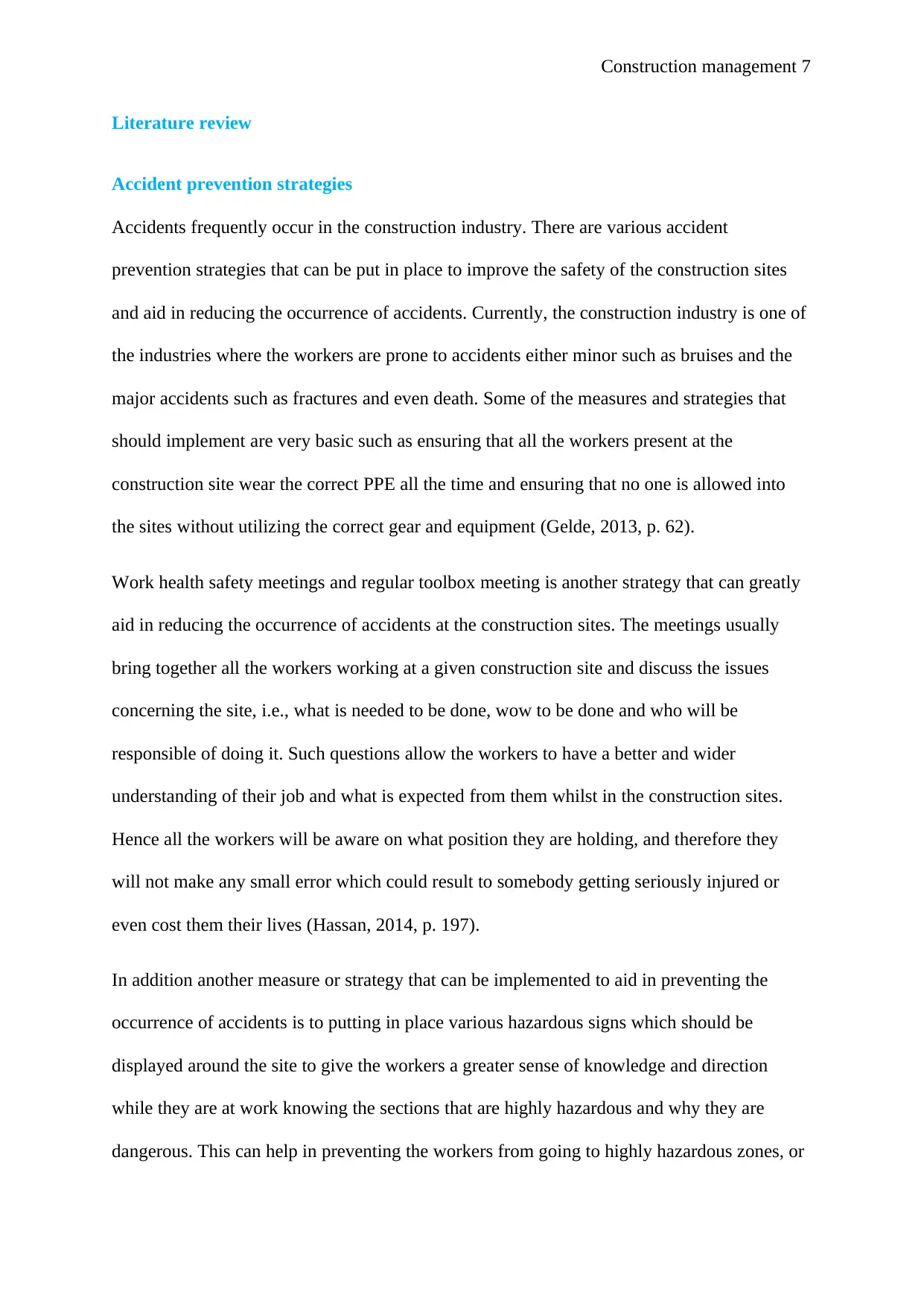
Construction management 7
Literature review
Accident prevention strategies
Accidents frequently occur in the construction industry. There are various accident
prevention strategies that can be put in place to improve the safety of the construction sites
and aid in reducing the occurrence of accidents. Currently, the construction industry is one of
the industries where the workers are prone to accidents either minor such as bruises and the
major accidents such as fractures and even death. Some of the measures and strategies that
should implement are very basic such as ensuring that all the workers present at the
construction site wear the correct PPE all the time and ensuring that no one is allowed into
the sites without utilizing the correct gear and equipment (Gelde, 2013, p. 62).
Work health safety meetings and regular toolbox meeting is another strategy that can greatly
aid in reducing the occurrence of accidents at the construction sites. The meetings usually
bring together all the workers working at a given construction site and discuss the issues
concerning the site, i.e., what is needed to be done, wow to be done and who will be
responsible of doing it. Such questions allow the workers to have a better and wider
understanding of their job and what is expected from them whilst in the construction sites.
Hence all the workers will be aware on what position they are holding, and therefore they
will not make any small error which could result to somebody getting seriously injured or
even cost them their lives (Hassan, 2014, p. 197).
In addition another measure or strategy that can be implemented to aid in preventing the
occurrence of accidents is to putting in place various hazardous signs which should be
displayed around the site to give the workers a greater sense of knowledge and direction
while they are at work knowing the sections that are highly hazardous and why they are
dangerous. This can help in preventing the workers from going to highly hazardous zones, or
Literature review
Accident prevention strategies
Accidents frequently occur in the construction industry. There are various accident
prevention strategies that can be put in place to improve the safety of the construction sites
and aid in reducing the occurrence of accidents. Currently, the construction industry is one of
the industries where the workers are prone to accidents either minor such as bruises and the
major accidents such as fractures and even death. Some of the measures and strategies that
should implement are very basic such as ensuring that all the workers present at the
construction site wear the correct PPE all the time and ensuring that no one is allowed into
the sites without utilizing the correct gear and equipment (Gelde, 2013, p. 62).
Work health safety meetings and regular toolbox meeting is another strategy that can greatly
aid in reducing the occurrence of accidents at the construction sites. The meetings usually
bring together all the workers working at a given construction site and discuss the issues
concerning the site, i.e., what is needed to be done, wow to be done and who will be
responsible of doing it. Such questions allow the workers to have a better and wider
understanding of their job and what is expected from them whilst in the construction sites.
Hence all the workers will be aware on what position they are holding, and therefore they
will not make any small error which could result to somebody getting seriously injured or
even cost them their lives (Hassan, 2014, p. 197).
In addition another measure or strategy that can be implemented to aid in preventing the
occurrence of accidents is to putting in place various hazardous signs which should be
displayed around the site to give the workers a greater sense of knowledge and direction
while they are at work knowing the sections that are highly hazardous and why they are
dangerous. This can help in preventing the workers from going to highly hazardous zones, or
Paraphrase This Document
Need a fresh take? Get an instant paraphrase of this document with our AI Paraphraser
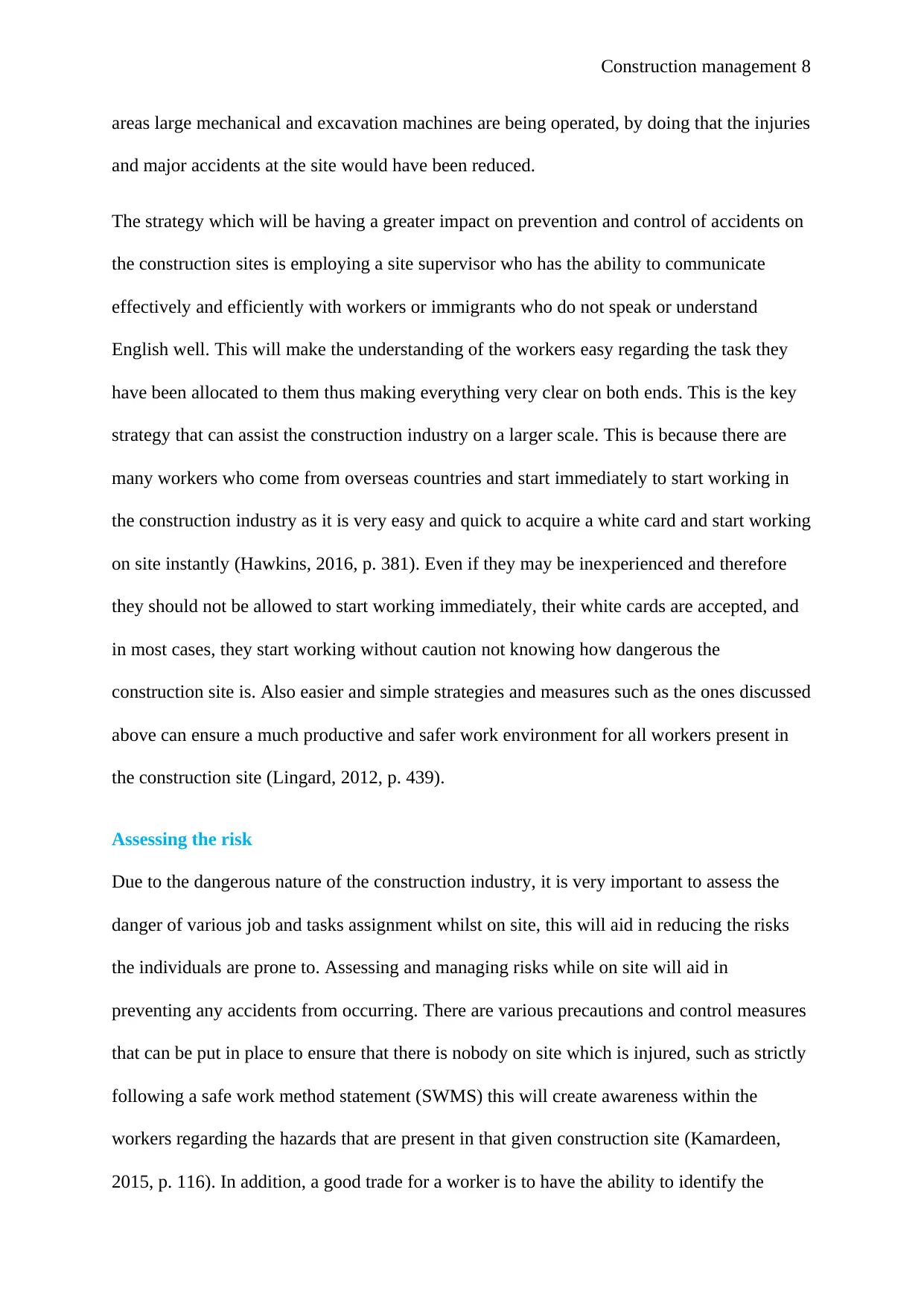
Construction management 8
areas large mechanical and excavation machines are being operated, by doing that the injuries
and major accidents at the site would have been reduced.
The strategy which will be having a greater impact on prevention and control of accidents on
the construction sites is employing a site supervisor who has the ability to communicate
effectively and efficiently with workers or immigrants who do not speak or understand
English well. This will make the understanding of the workers easy regarding the task they
have been allocated to them thus making everything very clear on both ends. This is the key
strategy that can assist the construction industry on a larger scale. This is because there are
many workers who come from overseas countries and start immediately to start working in
the construction industry as it is very easy and quick to acquire a white card and start working
on site instantly (Hawkins, 2016, p. 381). Even if they may be inexperienced and therefore
they should not be allowed to start working immediately, their white cards are accepted, and
in most cases, they start working without caution not knowing how dangerous the
construction site is. Also easier and simple strategies and measures such as the ones discussed
above can ensure a much productive and safer work environment for all workers present in
the construction site (Lingard, 2012, p. 439).
Assessing the risk
Due to the dangerous nature of the construction industry, it is very important to assess the
danger of various job and tasks assignment whilst on site, this will aid in reducing the risks
the individuals are prone to. Assessing and managing risks while on site will aid in
preventing any accidents from occurring. There are various precautions and control measures
that can be put in place to ensure that there is nobody on site which is injured, such as strictly
following a safe work method statement (SWMS) this will create awareness within the
workers regarding the hazards that are present in that given construction site (Kamardeen,
2015, p. 116). In addition, a good trade for a worker is to have the ability to identify the
areas large mechanical and excavation machines are being operated, by doing that the injuries
and major accidents at the site would have been reduced.
The strategy which will be having a greater impact on prevention and control of accidents on
the construction sites is employing a site supervisor who has the ability to communicate
effectively and efficiently with workers or immigrants who do not speak or understand
English well. This will make the understanding of the workers easy regarding the task they
have been allocated to them thus making everything very clear on both ends. This is the key
strategy that can assist the construction industry on a larger scale. This is because there are
many workers who come from overseas countries and start immediately to start working in
the construction industry as it is very easy and quick to acquire a white card and start working
on site instantly (Hawkins, 2016, p. 381). Even if they may be inexperienced and therefore
they should not be allowed to start working immediately, their white cards are accepted, and
in most cases, they start working without caution not knowing how dangerous the
construction site is. Also easier and simple strategies and measures such as the ones discussed
above can ensure a much productive and safer work environment for all workers present in
the construction site (Lingard, 2012, p. 439).
Assessing the risk
Due to the dangerous nature of the construction industry, it is very important to assess the
danger of various job and tasks assignment whilst on site, this will aid in reducing the risks
the individuals are prone to. Assessing and managing risks while on site will aid in
preventing any accidents from occurring. There are various precautions and control measures
that can be put in place to ensure that there is nobody on site which is injured, such as strictly
following a safe work method statement (SWMS) this will create awareness within the
workers regarding the hazards that are present in that given construction site (Kamardeen,
2015, p. 116). In addition, a good trade for a worker is to have the ability to identify the
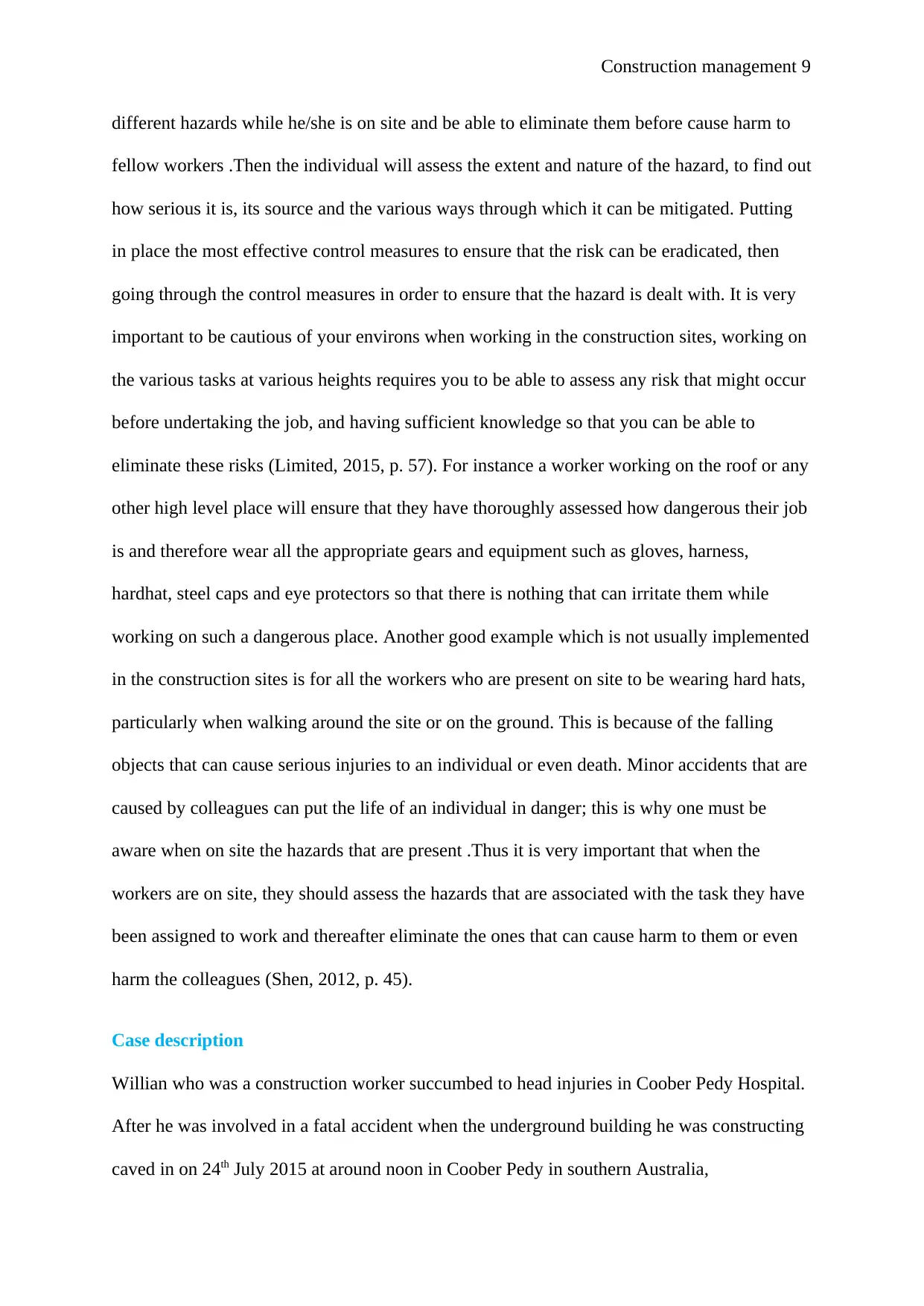
Construction management 9
different hazards while he/she is on site and be able to eliminate them before cause harm to
fellow workers .Then the individual will assess the extent and nature of the hazard, to find out
how serious it is, its source and the various ways through which it can be mitigated. Putting
in place the most effective control measures to ensure that the risk can be eradicated, then
going through the control measures in order to ensure that the hazard is dealt with. It is very
important to be cautious of your environs when working in the construction sites, working on
the various tasks at various heights requires you to be able to assess any risk that might occur
before undertaking the job, and having sufficient knowledge so that you can be able to
eliminate these risks (Limited, 2015, p. 57). For instance a worker working on the roof or any
other high level place will ensure that they have thoroughly assessed how dangerous their job
is and therefore wear all the appropriate gears and equipment such as gloves, harness,
hardhat, steel caps and eye protectors so that there is nothing that can irritate them while
working on such a dangerous place. Another good example which is not usually implemented
in the construction sites is for all the workers who are present on site to be wearing hard hats,
particularly when walking around the site or on the ground. This is because of the falling
objects that can cause serious injuries to an individual or even death. Minor accidents that are
caused by colleagues can put the life of an individual in danger; this is why one must be
aware when on site the hazards that are present .Thus it is very important that when the
workers are on site, they should assess the hazards that are associated with the task they have
been assigned to work and thereafter eliminate the ones that can cause harm to them or even
harm the colleagues (Shen, 2012, p. 45).
Case description
Willian who was a construction worker succumbed to head injuries in Coober Pedy Hospital.
After he was involved in a fatal accident when the underground building he was constructing
caved in on 24th July 2015 at around noon in Coober Pedy in southern Australia,
different hazards while he/she is on site and be able to eliminate them before cause harm to
fellow workers .Then the individual will assess the extent and nature of the hazard, to find out
how serious it is, its source and the various ways through which it can be mitigated. Putting
in place the most effective control measures to ensure that the risk can be eradicated, then
going through the control measures in order to ensure that the hazard is dealt with. It is very
important to be cautious of your environs when working in the construction sites, working on
the various tasks at various heights requires you to be able to assess any risk that might occur
before undertaking the job, and having sufficient knowledge so that you can be able to
eliminate these risks (Limited, 2015, p. 57). For instance a worker working on the roof or any
other high level place will ensure that they have thoroughly assessed how dangerous their job
is and therefore wear all the appropriate gears and equipment such as gloves, harness,
hardhat, steel caps and eye protectors so that there is nothing that can irritate them while
working on such a dangerous place. Another good example which is not usually implemented
in the construction sites is for all the workers who are present on site to be wearing hard hats,
particularly when walking around the site or on the ground. This is because of the falling
objects that can cause serious injuries to an individual or even death. Minor accidents that are
caused by colleagues can put the life of an individual in danger; this is why one must be
aware when on site the hazards that are present .Thus it is very important that when the
workers are on site, they should assess the hazards that are associated with the task they have
been assigned to work and thereafter eliminate the ones that can cause harm to them or even
harm the colleagues (Shen, 2012, p. 45).
Case description
Willian who was a construction worker succumbed to head injuries in Coober Pedy Hospital.
After he was involved in a fatal accident when the underground building he was constructing
caved in on 24th July 2015 at around noon in Coober Pedy in southern Australia,
⊘ This is a preview!⊘
Do you want full access?
Subscribe today to unlock all pages.

Trusted by 1+ million students worldwide
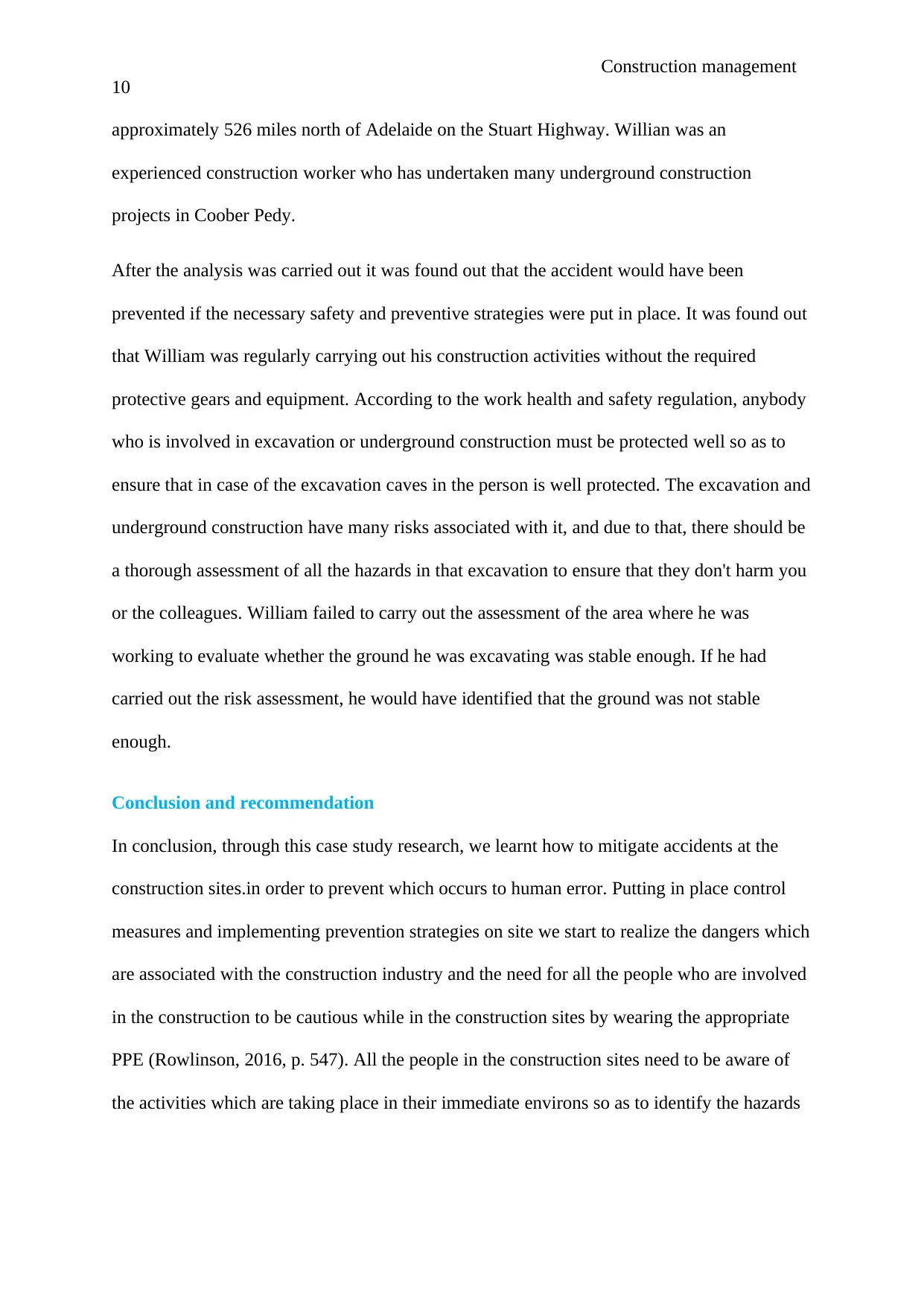
Construction management
10
approximately 526 miles north of Adelaide on the Stuart Highway. Willian was an
experienced construction worker who has undertaken many underground construction
projects in Coober Pedy.
After the analysis was carried out it was found out that the accident would have been
prevented if the necessary safety and preventive strategies were put in place. It was found out
that William was regularly carrying out his construction activities without the required
protective gears and equipment. According to the work health and safety regulation, anybody
who is involved in excavation or underground construction must be protected well so as to
ensure that in case of the excavation caves in the person is well protected. The excavation and
underground construction have many risks associated with it, and due to that, there should be
a thorough assessment of all the hazards in that excavation to ensure that they don't harm you
or the colleagues. William failed to carry out the assessment of the area where he was
working to evaluate whether the ground he was excavating was stable enough. If he had
carried out the risk assessment, he would have identified that the ground was not stable
enough.
Conclusion and recommendation
In conclusion, through this case study research, we learnt how to mitigate accidents at the
construction sites.in order to prevent which occurs to human error. Putting in place control
measures and implementing prevention strategies on site we start to realize the dangers which
are associated with the construction industry and the need for all the people who are involved
in the construction to be cautious while in the construction sites by wearing the appropriate
PPE (Rowlinson, 2016, p. 547). All the people in the construction sites need to be aware of
the activities which are taking place in their immediate environs so as to identify the hazards
10
approximately 526 miles north of Adelaide on the Stuart Highway. Willian was an
experienced construction worker who has undertaken many underground construction
projects in Coober Pedy.
After the analysis was carried out it was found out that the accident would have been
prevented if the necessary safety and preventive strategies were put in place. It was found out
that William was regularly carrying out his construction activities without the required
protective gears and equipment. According to the work health and safety regulation, anybody
who is involved in excavation or underground construction must be protected well so as to
ensure that in case of the excavation caves in the person is well protected. The excavation and
underground construction have many risks associated with it, and due to that, there should be
a thorough assessment of all the hazards in that excavation to ensure that they don't harm you
or the colleagues. William failed to carry out the assessment of the area where he was
working to evaluate whether the ground he was excavating was stable enough. If he had
carried out the risk assessment, he would have identified that the ground was not stable
enough.
Conclusion and recommendation
In conclusion, through this case study research, we learnt how to mitigate accidents at the
construction sites.in order to prevent which occurs to human error. Putting in place control
measures and implementing prevention strategies on site we start to realize the dangers which
are associated with the construction industry and the need for all the people who are involved
in the construction to be cautious while in the construction sites by wearing the appropriate
PPE (Rowlinson, 2016, p. 547). All the people in the construction sites need to be aware of
the activities which are taking place in their immediate environs so as to identify the hazards
Paraphrase This Document
Need a fresh take? Get an instant paraphrase of this document with our AI Paraphraser
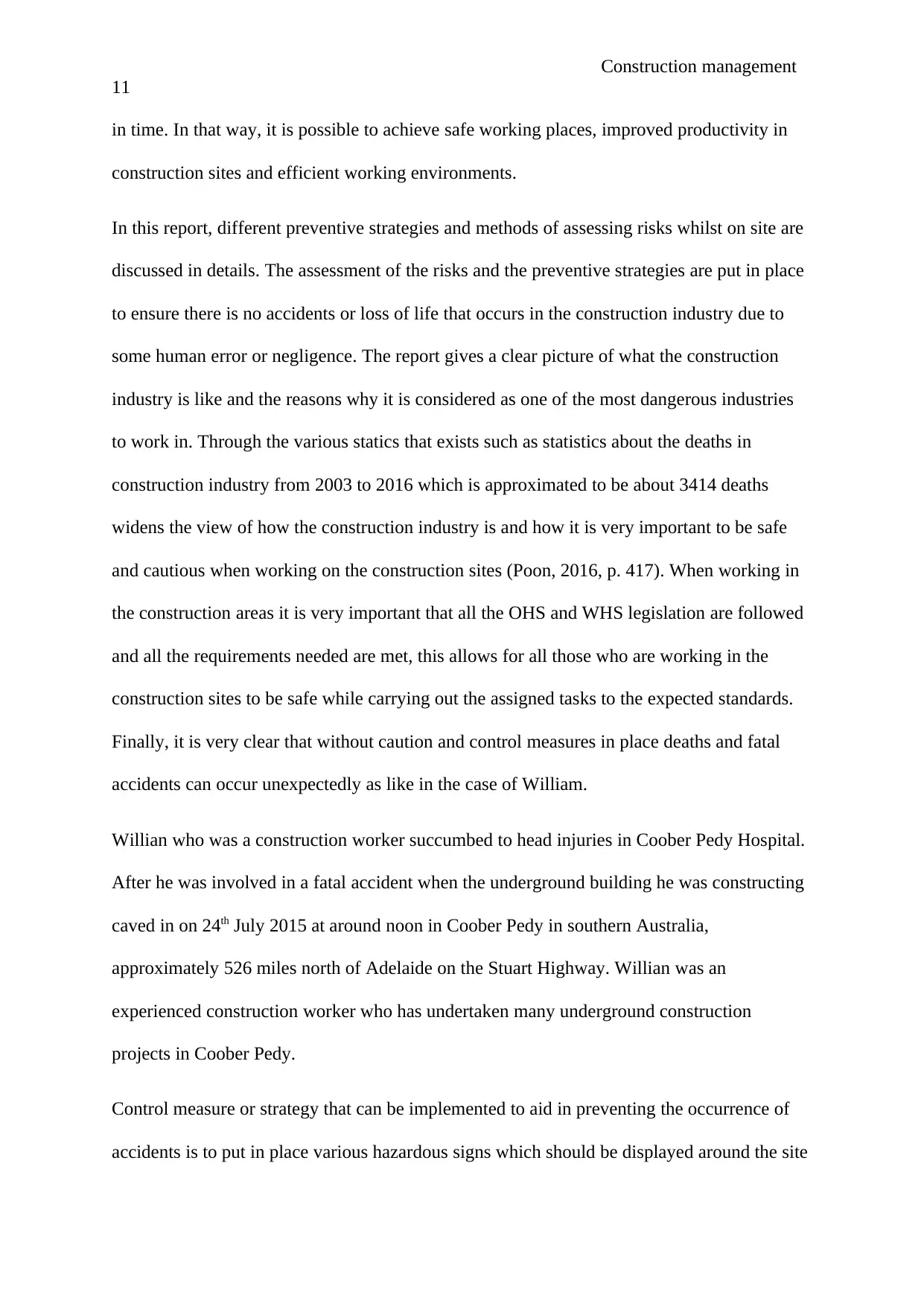
Construction management
11
in time. In that way, it is possible to achieve safe working places, improved productivity in
construction sites and efficient working environments.
In this report, different preventive strategies and methods of assessing risks whilst on site are
discussed in details. The assessment of the risks and the preventive strategies are put in place
to ensure there is no accidents or loss of life that occurs in the construction industry due to
some human error or negligence. The report gives a clear picture of what the construction
industry is like and the reasons why it is considered as one of the most dangerous industries
to work in. Through the various statics that exists such as statistics about the deaths in
construction industry from 2003 to 2016 which is approximated to be about 3414 deaths
widens the view of how the construction industry is and how it is very important to be safe
and cautious when working on the construction sites (Poon, 2016, p. 417). When working in
the construction areas it is very important that all the OHS and WHS legislation are followed
and all the requirements needed are met, this allows for all those who are working in the
construction sites to be safe while carrying out the assigned tasks to the expected standards.
Finally, it is very clear that without caution and control measures in place deaths and fatal
accidents can occur unexpectedly as like in the case of William.
Willian who was a construction worker succumbed to head injuries in Coober Pedy Hospital.
After he was involved in a fatal accident when the underground building he was constructing
caved in on 24th July 2015 at around noon in Coober Pedy in southern Australia,
approximately 526 miles north of Adelaide on the Stuart Highway. Willian was an
experienced construction worker who has undertaken many underground construction
projects in Coober Pedy.
Control measure or strategy that can be implemented to aid in preventing the occurrence of
accidents is to put in place various hazardous signs which should be displayed around the site
11
in time. In that way, it is possible to achieve safe working places, improved productivity in
construction sites and efficient working environments.
In this report, different preventive strategies and methods of assessing risks whilst on site are
discussed in details. The assessment of the risks and the preventive strategies are put in place
to ensure there is no accidents or loss of life that occurs in the construction industry due to
some human error or negligence. The report gives a clear picture of what the construction
industry is like and the reasons why it is considered as one of the most dangerous industries
to work in. Through the various statics that exists such as statistics about the deaths in
construction industry from 2003 to 2016 which is approximated to be about 3414 deaths
widens the view of how the construction industry is and how it is very important to be safe
and cautious when working on the construction sites (Poon, 2016, p. 417). When working in
the construction areas it is very important that all the OHS and WHS legislation are followed
and all the requirements needed are met, this allows for all those who are working in the
construction sites to be safe while carrying out the assigned tasks to the expected standards.
Finally, it is very clear that without caution and control measures in place deaths and fatal
accidents can occur unexpectedly as like in the case of William.
Willian who was a construction worker succumbed to head injuries in Coober Pedy Hospital.
After he was involved in a fatal accident when the underground building he was constructing
caved in on 24th July 2015 at around noon in Coober Pedy in southern Australia,
approximately 526 miles north of Adelaide on the Stuart Highway. Willian was an
experienced construction worker who has undertaken many underground construction
projects in Coober Pedy.
Control measure or strategy that can be implemented to aid in preventing the occurrence of
accidents is to put in place various hazardous signs which should be displayed around the site
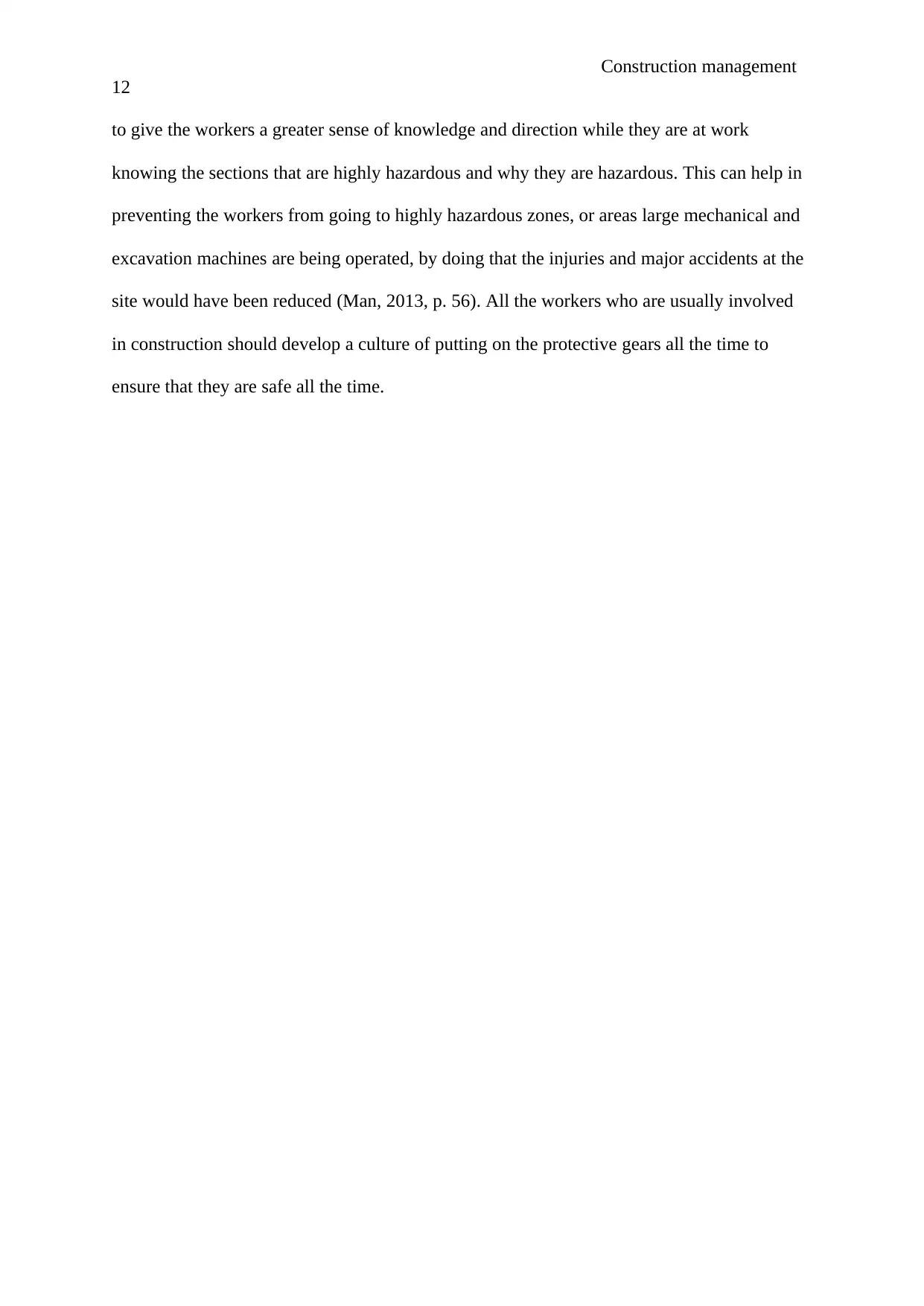
Construction management
12
to give the workers a greater sense of knowledge and direction while they are at work
knowing the sections that are highly hazardous and why they are hazardous. This can help in
preventing the workers from going to highly hazardous zones, or areas large mechanical and
excavation machines are being operated, by doing that the injuries and major accidents at the
site would have been reduced (Man, 2013, p. 56). All the workers who are usually involved
in construction should develop a culture of putting on the protective gears all the time to
ensure that they are safe all the time.
12
to give the workers a greater sense of knowledge and direction while they are at work
knowing the sections that are highly hazardous and why they are hazardous. This can help in
preventing the workers from going to highly hazardous zones, or areas large mechanical and
excavation machines are being operated, by doing that the injuries and major accidents at the
site would have been reduced (Man, 2013, p. 56). All the workers who are usually involved
in construction should develop a culture of putting on the protective gears all the time to
ensure that they are safe all the time.
⊘ This is a preview!⊘
Do you want full access?
Subscribe today to unlock all pages.

Trusted by 1+ million students worldwide
1 out of 14
Related Documents
Your All-in-One AI-Powered Toolkit for Academic Success.
+13062052269
info@desklib.com
Available 24*7 on WhatsApp / Email
![[object Object]](/_next/static/media/star-bottom.7253800d.svg)
Unlock your academic potential
Copyright © 2020–2026 A2Z Services. All Rights Reserved. Developed and managed by ZUCOL.




